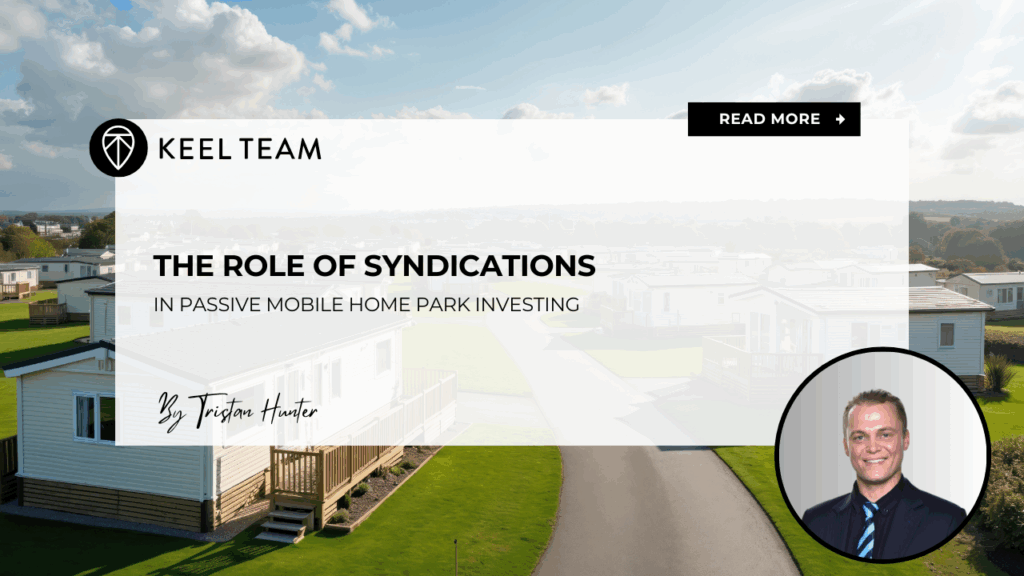The Role of Syndications in Passive Mobile Home Park Investing
-
 Tristan Hunter - Investor Relations
Tristan Hunter - Investor Relations

Passive mobile home park investing has become an increasingly popular way for individuals to participate in real estate without the demands of day-to-day property management. One key structure that allows passive investors to access these opportunities is a syndication. Understanding the role of syndications can help investors make informed decisions and set realistic expectations.
In this article, we will explore what syndications are, how they work in mobile home park investing, the benefits and risks, and why they are often a preferred path for passive investors.
What is a Mobile Home Park Syndication?
A mobile home park syndication is a legal and financial structure that allows multiple investors to pool their capital to acquire a mobile home park. Typically, there are two key parties in a syndication: the sponsor (or operator) and the passive investors.
Sponsor Role
The sponsor identifies, acquires, and manages the mobile home park. They handle operational tasks such as rent collection, maintenance, tenant relations, and reporting to investors. Sponsors may also make decisions about property improvements or refinancing strategies.
Passive Investor Role
Passive investors contribute capital to the syndication but do not take part in day-to-day management. They rely on the sponsor’s expertise and experience to operate the mobile home park efficiently. In return, investors often receive distributions, potential appreciation, and tax benefits associated with ownership.
Download our FREE eBook on the Top 10 things to know BEFORE investing PASSIVELY in mobile home parks!
How Mobile Home Park Syndications Work
Syndications are structured to comply with federal securities regulations, typically under Regulation D of the Securities Act. This allows sponsors to raise capital from accredited investors and sometimes non-accredited investors, depending on the offering type.
Step 1: Acquisition
The sponsor identifies a mobile home park that meets investment criteria, including location, occupancy rates, cash flow potential, and growth opportunities. Due diligence is performed to assess the property’s financials, legal standing, and physical condition.
Step 2: Capital Raising
The sponsor creates a Private Placement Memorandum (PPM) outlining the investment opportunity, risks, and projected returns. Passive investors review this document before committing capital.
Step 3: Property Management
Once the mobile home park is acquired, the sponsor handles operations. This includes managing tenants, maintenance, and financial reporting. Passive investors receive regular updates but typically do not engage in management decisions.
Step 4: Exit or Refinance
Mobile home park syndications usually have a projected hold period, often 5 to 10 years. The sponsor may sell the property, refinance it, or take other strategic actions to generate returns for investors.
Benefits of Syndications in Passive Mobile Home Park Investing
Access to Larger Deals
Syndications allow passive investors to participate in mobile home park deals that would be difficult to acquire individually. By pooling capital, investors can access larger, professionally managed properties.
Diversification
Investors can diversify their portfolios by investing in multiple syndications across different regions. This can reduce exposure to localized economic or market risks.
Professional Management
A key advantage of syndications is that the sponsor takes on the operational responsibilities. Passive investors benefit from the sponsor’s experience without needing to manage tenants, maintenance, or property upgrades themselves.
Potential Cash Flow and Appreciation
Passive investors may receive regular cash distributions from rental income and potentially benefit from appreciation if the mobile home park increases in value over time. While these returns are not guaranteed, syndications aim to provide consistent income streams.
Risks Associated with Mobile Home Park Syndications
While syndications offer many benefits, passive investors should understand the inherent risks.
Market and Tenant Risks
Mobile home park performance depends on occupancy rates and tenant stability. Changes in local economic conditions, employment, or housing demand may impact rental income.
Sponsor Risk
Investors rely heavily on the sponsor’s expertise. Poor decision-making, lack of experience, or misalignment of interests can affect returns. Evaluating the sponsor’s track record and transparency is crucial.
Liquidity Risk
Syndications are generally illiquid investments. Passive investors may not be able to withdraw their capital before the planned exit, meaning funds could be tied up for several years.
Regulatory and Environmental Risks
Changes in zoning, rent control laws, or environmental regulations may influence mobile home park operations. While due diligence and proactive management can reduce exposure, regulatory risks cannot be eliminated entirely.

How Sponsors Mitigate Risks in Mobile Home Park Syndications
Experienced sponsors often implement strategies to reduce risk and protect passive investors.
Thorough Due Diligence
Before acquiring a mobile home park, sponsors conduct financial, legal, and physical inspections. This includes reviewing leases, evaluating infrastructure, and assessing potential environmental concerns.
Conservative Financial Modeling
Sponsors frequently use conservative assumptions in financial projections, including vacancy rates, expense increases, and potential capital expenditures. This approach helps prepare for unexpected market shifts.
Transparent Communication
Regular reporting and open communication with investors can help maintain trust and alignment. Sponsors may provide monthly or quarterly updates on financial performance and operational activities.
Alignment of Interests
Many sponsors co-invest in the mobile home park alongside passive investors. This ensures that the sponsor’s interests are aligned with those of the investors, creating an incentive to maximize property performance.
Key Considerations for Passive Investors
Passive investors should carefully evaluate syndication opportunities before committing capital. Important considerations include:
- Sponsor Track Record – Review the sponsor’s experience and past performance with mobile home park investments.
- Investment Structure – Understand fees, preferred returns, and distribution schedules.
- Property Analysis – Assess location, occupancy, infrastructure, and potential for improvements.
- Risk Tolerance and Liquidity Needs – Consider how the investment fits with long-term financial goals.
- Regulatory Compliance – Confirm that the offering complies with securities regulations and that disclosures are clear.
The Future of Syndications in Passive Mobile Home Park Investing
As demand for affordable housing continues to grow, mobile home parks remain an attractive option for real estate investors. Syndications are likely to continue playing a critical role by allowing passive investors to participate in larger, professionally managed properties while mitigating some operational and financial challenges.
While syndications provide access and professional management, investors should remain aware that all investments carry risks, and returns are never guaranteed. Conducting thorough due diligence, evaluating sponsors carefully, and understanding market dynamics are key steps for anyone considering a passive mobile home park investment.
Conclusion
Syndications serve a vital role in passive mobile home park investing by connecting capital with professional operators, allowing investors to participate in real estate without managing daily operations. They typically offer access to larger deals, potential cash flow, and diversification, while presenting unique risks that must be carefully evaluated.
By understanding how syndications work, the roles of sponsors and investors, and the strategies used to mitigate risks, passive investors can make more informed decisions and set realistic expectations. Mobile home park syndications are not risk-free, but with careful consideration, they can be an effective path for building passive income and long-term wealth in real estate.
Are you looking for MORE information? Book a 1-on-1 consultation with Andrew Keel to discuss:
- A mobile home park deal review
- Due diligence questions
- How to raise capital from investors
- Mistakes to avoid, and more!
Disclaimer:
The information provided is for informational purposes only and is not investment advice or a guarantee of any kind. We do not guarantee profitability. Make investment decisions based on your research and consult registered financial and legal professionals. We are not registered financial or legal professionals and do not provide personalized investment recommendations.

Tristan Hunter - Investor Relations
View The Previous or Next Post
Subscribe Below 👇





